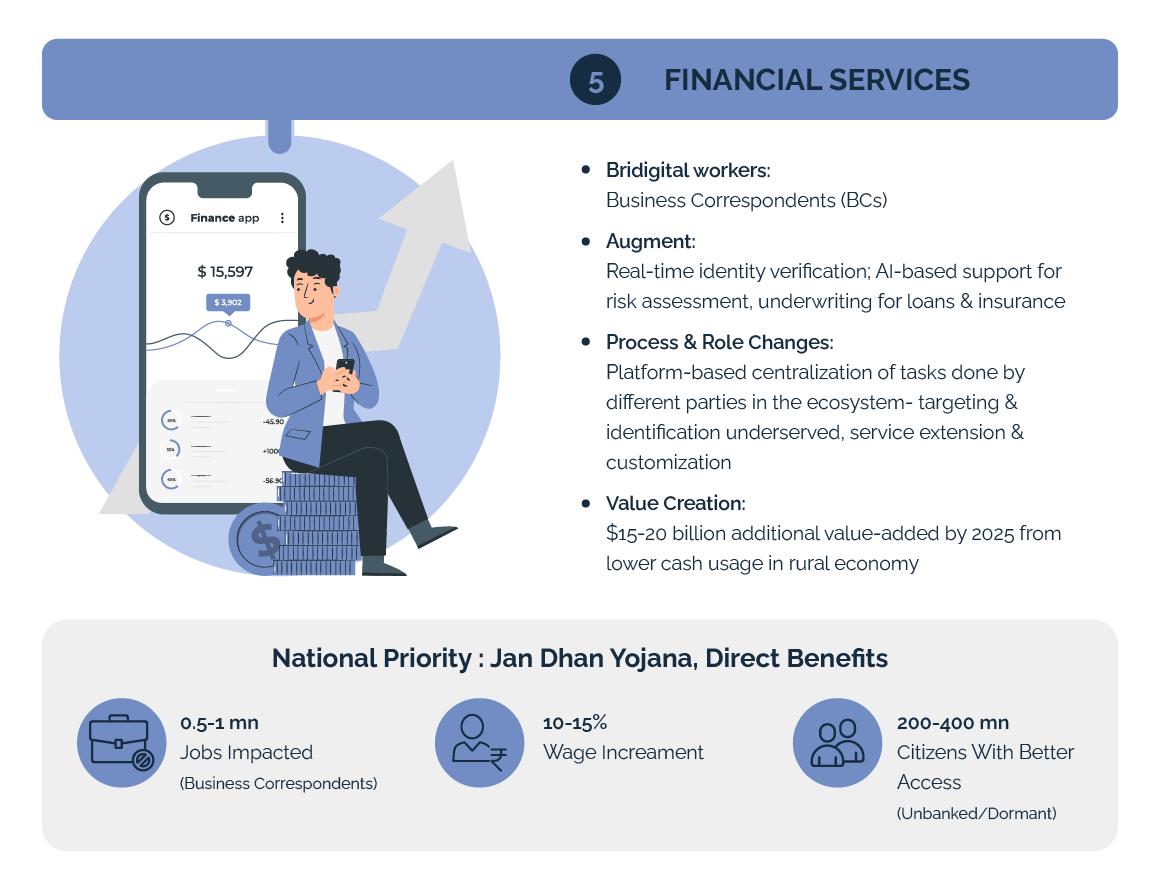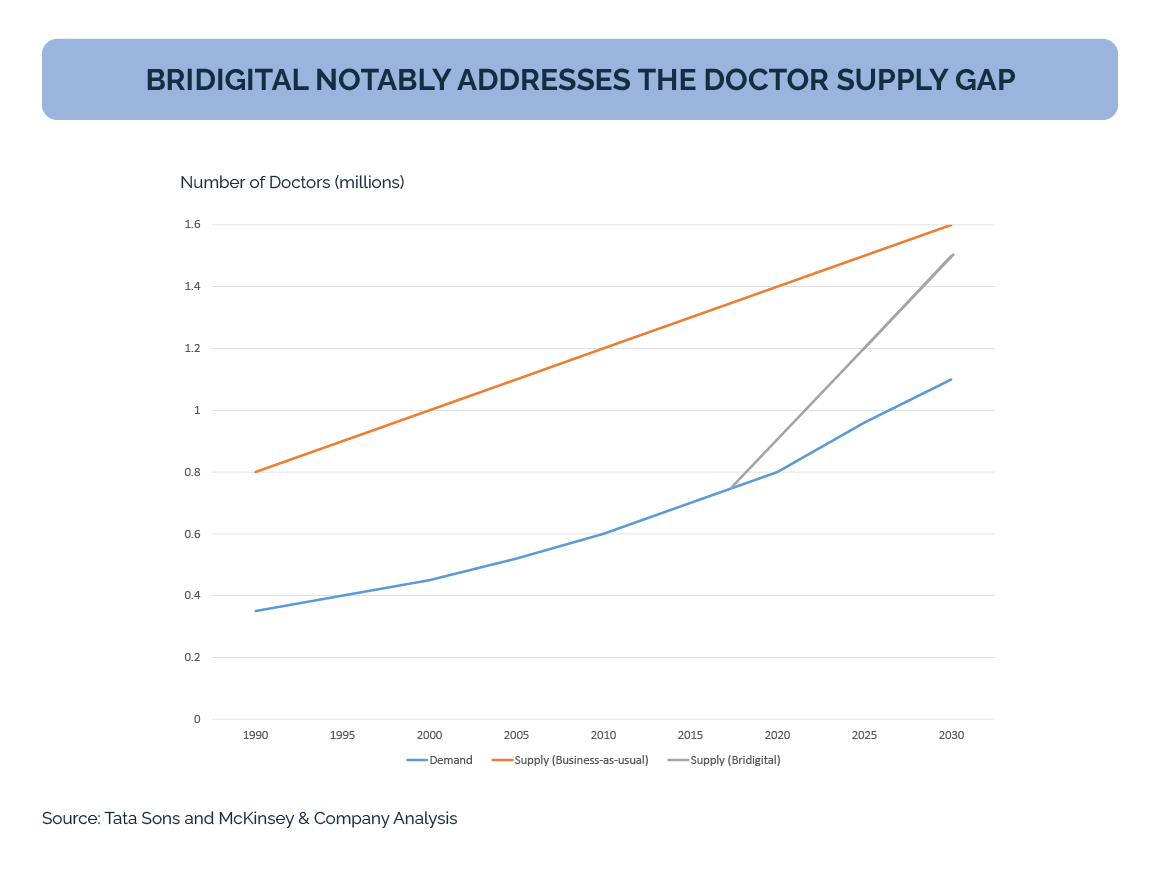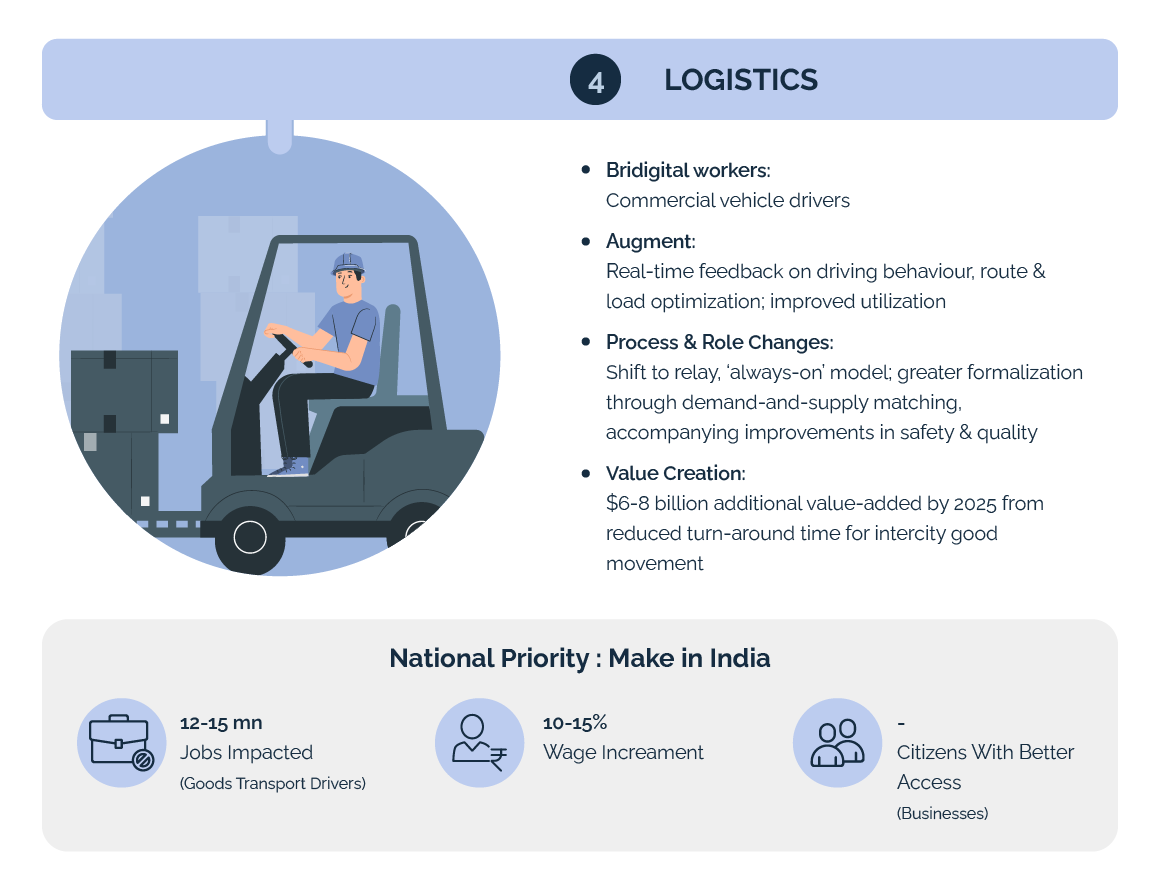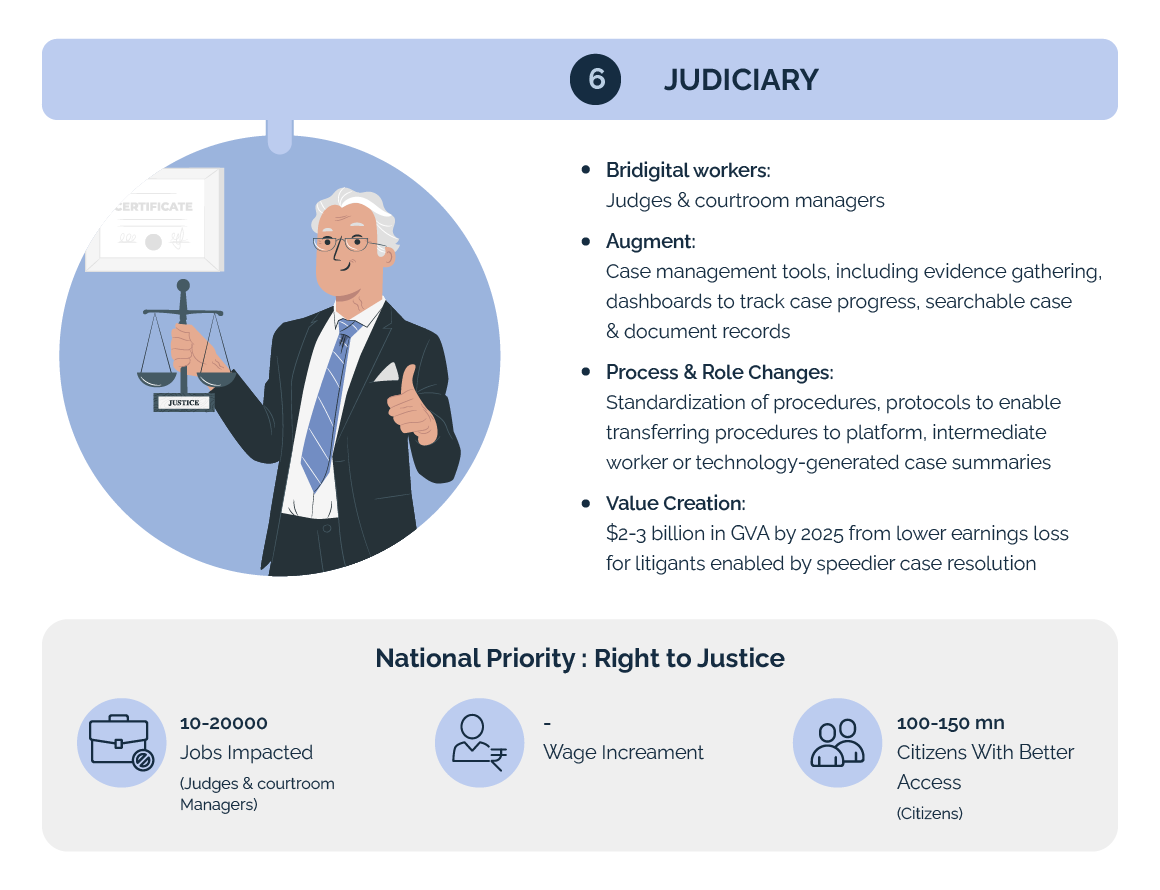Bridgital Nation
Introduction
About the book
The book Bridigital Nation addresses the need to build human bridges, which recognises the diversity of human interface with its varied education base skill sets and access to infrastructure. It shows how the available technology and available human resources of India can act hand-in-hand for the success of transformation into the digital world of tomorrow. The book emphasises that if the future of India has to be harnessed, it has to come from a mutually beneficial relationship between its citizens and new applications of technology.
About the authors
The author of this book is N Chandrasekaran, Chairman of the Board at TATA Sons and Roopa Purushothaman, Chief Economist & Head of Policy Advocacy at the Tata Group. They have successfully put forth their innovative and creative thoughts of using technology as a bridge to overcome India’s contemporary macroeconomic challenges.
Buy the book
The book provides you with useful insights into the technological development that might change the way you live your life in the near future. We highly recommend you to read the entire book. (affiliate link)
Macro Economic Analysis – India
India of the numbers is different from India of the senses.
India of Numbers tells us that progress and prosperity are imminent - it is set to become the 3rd largest economy by 2030. By 2050, it's GDP per capita could rise to Rs.1.1 million- It is set for unprecedented youth takeover.
But the Indian economy really lives on its averages. India of the senses tells us that even though India is projected to be the world's third largest economy by 2030 -a global economic powerhouse but majority of its citizens will struggle with the bare essentials of a middle class lifestyle.
India of the numbers and sense, between averages and lived experiences will be far from Bridged.
India's main problems called the Twin problems are – Jobs(Gainful employment) and Access to Vital Services
a. Jobs- With around 90 million people coming of working age between 20-30, the entrants who will eventually find work will be disappointed by the India growth story sold to them. Most jobs will be in the informal sector with low productivity, low wages jobs and absence of job security and safety- all these qualify to be bad jobs.
A sizable portion will struggle to find gainful employment.
b. Access to vital services- Another major problem is access to vital services such as quality health, education, judiciary which is out of reach for millions of people. We need more doctors, teachers, agriculture extension workers, judges, plumbers and researchers.
Access challenges have other costs.The primary sector being underdeveloped,especially in rural areas,people travel extensively at high cost – causing overcrowding of places especially secondary and tertiary health sectors.
For example, authors have shown how the remotest parts of a country like the north east don’t have dependable primary health care and people travel to far off places for basic diagnosis and treatment. For small treatments, big hospitals and doctors are knocked upon leading to overcrowding.
In short, India has an overwhelming demand for vital services and an overwhelming supply of human capital. It just doesn't know how to build a bridge between them.
The Solution
Bridigital nation tries to answer how technology and its innovations can solve India's twin problems.
There are more Indians jostling for the same resources every month and skilled people are rare. We have to harness AI, the cloud, machine learning & IoT- combination of these technologies can provide answers to problems that would be considered intractable just a few years ago.
We have to be razor focussed on what is needed. Not technology for technology's sake but technology in context- applied in ways that makes sense for people and that can help increase the yield of India's existing human and physical resources.
We have to adopt technology relevant to india. For example, Aakash tablet programme was a complete failure as focussed heavily on developing an affordable device and not enough on how a tablet could change students’ educational experience. It was shunned by teachers as very few textbooks were digitized. The tablets ultimately became a burden to its users, who couldn’t afford its maintenance.
The future of India is to harness and it has to come from a mutually beneficial relationship between its citizens and new applications of Technology. Neither Human or machine alone can help in the preparation for the great changes at its doorstep. Technology will bring destruction, change of order, jobs will be lost but others will be created.
For Example, when cars replaced railway engines, new technology and jobs emerged at fuel stations, repair shops and automobile dealers. Instead of being fearful of the disruption, we have to embrace our world where both human and technology coexist.
We know, deep in our bones, this time the technology transition is different. With cognition being automated with AI, there are questions of human irrelevance. But even now the most advanced robots have the intelligence of a cockroach. We have time!
And automation should be viewed as a human aid, not a replacement for human intervention. This approach will be Bri-digital.
What Is Bridigital?
Bridigital addresses access challenges through a re-imagining of the tasks and processes that make up a job, and complementing this with technology that enhances and supports workers. It has 3 elements:
Bridigital processes-
Redefining what exactly is needed and delivering solutions to everyone, especially to those without access. It involves rethinking conventional approaches to who-does-what in the value-chain of service delivery.
For instance :
Bridigital technology- It pushes limits of how efficiently we can make use of valuable assets such as physical assets and time of high skill workers.
Bridigital workers- digital literacy and technology enabled workers can perform tasks currently done by high skilled workers hence improve the service quality and standardisation of the service delivery.
Example- In the health sector, the doctor could transfer the data collection, maintaining patient history, temperature, BP to digitally augmented workers and use the freed up time to serve the underserved. The data they collect could be analysed instantly by medical software. The Accredited Social Health Activist (ASHA) workers could be the digitally empowered bridigital workers.
Challenges To Opportunity
Bridigital Nation can turn a challenge into an opportunity:
Seeing India's access challenge as the engine of Employment generation - it builds a tech-based bridge between the dual parts of the Indian economy and builds a 'middle' that India sorely needs.
In this approach, technology will amplify India's resources and extend them to many more Indians. How services can be delivered and how people can use their talents differently, once aided by technology. By using AI, machine learning, IoT and cloud in a deliberate way, it can help people access service and provide gainful employment.
An additional layer of workers will emerge who can intermediate both technology and existing resources for a larger number of people. Workers augmented by technology take on tasks previously done by experts and specialists. Experts will be freed to provide vital services. The result will be a more inclusive, productive and formalised system.
By using Bridgtal approach in health, education, agriculture, financial services, Logistics, the benefits could be:
a. Increase in approx. 30 million jobs .
b. Increase in wages by 20 – 30%
c. Access to better services like health and education for 200 million citizens.
This gift can keep on giving- Freedom from disease and despair, lower transaction costs, access to better education, better quality of life can unleash the creative and productive potential and employability of workers. It can set off a virtuous cycle of inclusion and growth.
India – An Antarlaapika
India is an Antarlaapika in which the answers to its puzzle/riddle are hidden within the riddle itself.
Informal economy is Huge: If the economy were an iceberg, the informal size would be hidden beneath the water surface, encompassing a huge range of occupations. Farming and construction would be among them. So would car repair shops, traders, shop owners, textile workers and Beedi rollers.
India's challenge: Productive employment is still Skill-Intensive while the workforce is not.
The formal sector meanwhile has a different problem: Vacancies. There are over 5800 vacancy seats for judges; the vacancy rates for general physicians in the Indian Public Health system is over 32%, Elementary schools in Uttar Pradesh and Bihar need 4 lakh teachers. In the private sector 56 percent of employees find it difficult to fill vacant roles. Even when these roles are filled it takes another 1 year to train them for work.
India has a skewed profile: Too few have completed secondary education as compared to other countries. This situation has a rise in part because India invests heavily in tertiary education while not investing enough in primary and secondary education. As a result, the education profile is peculiar; citizens tend to be either highly educated or minimally educated with not many in between. One of the ways that can right this talent mismatch is by focusing on its secondary educated workforce.
We need to simultaneously ramp up skills, focus more on secondary education and free up room for more employers to move informal work closer to the formal end of the spectrum. This is the key to India's jobs puzzle.
Wrapping Technology Around People
Indians go to spectacular lengths for the most basic things. Simple tasks are made exceptional only by difficulty in achieving them. Indians are yet to adopt technology on a big scale. The market for technology is yet to develop, unlike developed economies.
1. Access is more important than efficiency for India
2. Limited supply of skilled human resources and physical aids need to make most of the resources - through a combination of both people and Technology.
3. India's demographics demand a different approach to automation and AI. The median age of India will be 28 by 2030. The problem India has is not of age or numbers; it is skills and qualifications. Therefore, India’s approach to automation has to be distinct from that of the US, China or Japan. It has to focus on technologies that augment and raise people skills. Boosting a range of labour intensive, intermediate economic activities that takes care of India's vast unmet demand and shifting people towards more formal characteristics of work. Bridigital is a way of doing just this.
Three key lessons:
1. Reimagining processes using technology and not just plain adoption of Technology- The indirect gains and the correct application of Technology in the right context is important. Technology alone does not solve difficult problems. But when technology is applied in context with reimagined processes, the results can be magical.
Example: When electricity was discovered, the initial twenty years brought only small improvements in productivity. It was only between 1920-1935, the businesses changed to take advantage of new technology(electricity) to show marked improvement in productivity. How? Because electricity, with its ease of distribution allowed for more logical arrangement of machines, making the process faster and efficient. Thus, the indirect gains from changing factory processes far outweighed the direct benefit of the lower energy costs electricity offered. In the Indian context, we need to adopt those technologies that empower the labour rather than substituting it. For example- the nurses and ASHA workers can be given access to medical software to tabulate information and offer basic remedies suggested by software freeing up doctors for more prominent jobs.
2. Nothing is purely digital or purely physical- They have to complement and not substitute each other. Online and physical stores both are relevant.
Global Research says that firms achieve the most significant improvement when humans and machines work together. What comes naturally to people- (making a joke for example) can be tricky for machines and what's straightforward for machines remains virtually impossible for humans. Businesses require both kinds of capabilities.
3. Grasp the shape and sprawl of technological adoption- It should be affordable and the social, legal and the political moment right.
4. As bridigital graduates go on to join other sectors with higher demand and rewards for their skills, less qualified workers can go on the Bridigital ramp. In this vision, the future of training and skilling will be less about specific industries and roles and more about digital skills (understanding how to interact with technology), 21st century skills such as critical thinking, creativity and collaboration and lifelong learning.
Technology provides the opportunity to generate gainful employment instead of investing blindly in labour substituting automation.

The XX Factor
India needs two strategies to address jobs and access while complementing digital approach:
1. The XX Factor -Bringing women to the workforce
2. Entrepreneurs everywhere -Preparing the ground for thriving entrepreneurs throughout the country.
The XX Factor
Despite the pressing case for women working, just 23% of Indian working age women are in the labour force.
More than 120 million women have Secondary Education but they do not participate in the workforce. Even if half of them entered the workforce, the number of people with secondary education in the workforce would increase from 33% to 46%!
India's workforce is missing out on its educated women. The problem is not just of bringing women into the workforce but of ensuring that they stay in the course.
Three reasons why women are not there?
1. Unpaid work
2. Safety and mobility
3. Underlying gender norms
A typical educated urban working woman with a child loses over 15% of salary due to the gender pay gap and about one sixth to childcare.
For every hour of housework that men put in cleaning, nurturing, cooking women put in 10 hours. This is another kind of a shadow economy.
Solutions to get women working:
1. India should invest heavily in the care sector. The biggest challenge is to end the stigma of outsourcing care because of guilt associated with it. Investing in Creches and old age homes and nurturing centers can lessen the burden on women and encourage their participation in the workforce.
2. Address unintended consequences through smart gender policies- Revision of Maternity bill, revisiting the equal remuneration act.
3. Amplify the counter narrative
- Start early-we should have textbook showing gender neutrality
- Magnifying experiences that break the mold of relatable role models helps in changing the mindset.
- Industry level collaboration and targeted platforms can help prepare the ground for gender balance.
Everywhere Entrepreneurship
In India, there are either large business houses or tiny firms that have fewer than 10 workers. Between them is a vast emptiness with dynamic companies that are neither gargantuan nor miniscule. We lack SMEs.
These firms can provide the bulk of productive employment in India if they existed in large numbers. In India, SMEs employ 10%, whereas in the USA -it is 36%, Germany - 43% and Brazil 39%.
Micro Enterprises are informal—which means low productivity and growth.
The productivity forgone is substantial; an Indian manufacturing firm of 50-200 employees is nearly four times as productive than one with between 5 and 50. The differences between the formal and informal sector is even more stark. Formal sector manufacturing firms are 8 times as productive.
Micro firms dominate India's employment landscape, unlike its global peers.
In India, Entrepreneurship is not what is typically imagined as ‘unicorns’- with high growth, venture funded tech start-ups valued at over a billion dollars that attract the headlines.
India currently has 18 of these. India needs many of these. The cumulative effect of hundreds of thousands of SMEs could be massive.
Goldilocks entrepreneurs are too small for some and yet not small enough for others.
For example, they don't qualify for micro-enterprise schemes nor do they fit in the radar of venture capitalists because of inability to scale rapidly. They don't get adequate finance required to grow. Small businesses have 100% risk and attract 0% sympathy.
There is little support for informal businesses to grow and formalize themselves.
In the last few years India has shot 53 places in the ease of doing business rankings which assess countries on 10 different dimensions including credit, property, registration and success.
This does not necessarily translate into ease of business environment for small and medium entrepreneurs. In the judicial system and enforcing contracts India ranks 163 out of 190 countries. Entrepreneurs feel the weight of slow dispute resolution.
India’s Focus is on the two extremes of entrepreneurship- high growth start-ups and micro enterprises. But it is in between these two extremes that the country will need to invest. India needs many SMEs. We call this entrepreneurship movement everywhere.
Bridigital Cluster Can Spur Everywhere Entrepreneurship
To create a physical cluster among 722 districts in India would be daunting.
Finance- Digital lending companies can provide finance using cash flows history, psychometric assessment and social media behaviour. Digital recruitment and training are also becoming mainstream.
Creating a bridigital cluster will need a crucial piece of innovation- platforms that provide entrepreneurs with an easy way to access services. A functional platform could help proliferation of everywhere entrepreneurs wherever they are based in India.
The greatest value of a digital cluster is that it democratises a range of services that only formal businesses can access today. This has the potential to make the Everywhere Entrepreneur movement truly inclusive involving even small, informal entrepreneurs.
The creation of a digital cluster changes the landscape. It breaks down those various services into discrete modules each representing a small step that a business could take, if it saw value in doing so. Each step takes business closer to the formal end of the spectrum.
In this process, the Bridigital clusters can be enablers of Trust by providing verified digital services. Firms can be freed to forge their own path to formality.
That is why boosting the use of digital technology should be one of India's paramount priorities.
The High Costs of Formality Will be Lowered in the Bridgital World.

Digital governance can transform the relationship between SMEs and the Bureaucracy -The real imperative is to eschew piecemeal digitisation, attempting instead to transform the relationship between SMEs and the government. It is not only about limiting the duplication of effort for entrepreneurs but also bringing growth opportunities.
Story of Estonia is a real one where the data collection happens only once and is maintained with all the government and important offices so that it is all singular and people do not have to give the same information everywhere. It really makes it easy to do business. India can follow the same approach as that of Estonia. The beauty of digital approaches that scale can take hold.
Bridgital In Action
In the digital world, lower wage, digitally augmented workers are able to take on tasks previously done by experts and specialists. This frees up time and capacity for the latter to use their skills optimally.
Technology allows the seamless transfer of the freed up time and capacity- mediated by digitally augmented workers to cater the needs of the underserved.
The result is an enhanced system since the specialised workers focus on what they do best and other workers take on your mundane tasks. Most importantly, it is more inclusive.
For Example, in the health sector the doctor could transfer the data collection, maintaining patient history, temperature, BP to digitally augmented workers and use the freed up time to serve the underserved. The data they collect could be analysed instantly by medical software.

Applications of digitalisation in certain fields is more relevant than others
1.Agriculture- The digital makeover in agriculture will be centered around agriculture extension workers. The transformation could be in the form of a digital platform that offers information and farming in Science based on granular data; things currently farmers have lack of access to.

2.Logistics- A bridgital approach in logistics would make the perilous job of a truck driver simpler, safer and more productive. A platform could train drivers, insure them, remind them of safety measures, provide real-time guidance on routes and driving behaviour and direct them to the nearest place where they could get a good night's sleep. It could also include infrastructure that makes this a reality, such as rest stops with proper food, sanitation and dormitory facilities in critical locations. It could turn long-distance transport into a relay type task, breaking up a cross country journey into multiple day long trips by a succession of drivers. This would reduce transit time by 50% or more.

3.Judiciary- Digitally augmented courtroom managers could help reduce the workload of judges and also tide over the 5800 courtroom vacancies currently. Records would be digitised, case summaries would be supported by AI, and courts would know instantly if the same case was being heard by courts in different locations.

Adopting Technology
Certain things to keep in mind when adopting technology:
- Data privacy- Recognising individuals right over their personal data. India needs an authority that provides redress for unauthorised access to data.
- Freedom to experiment with existing roles and create new ones- For example, advanced nurse practices can prescribe certain drugs under circumstances and not just doctors. Some more lightness of touch is needed when India limits what its professionals are permitted to do.
- Technology can help overcome old apprehensions by redefining how services are delivered. With recognition of digital signatures and remote consultations becoming the norm, the precaution is a hurdle to better ways of functioning. There are very likely similar instances of well-meaning regulations in other industries that have outlived their purpose.
- Digital skilling needs official recognition- By certifying the knowledge that augmented workers gain in the course of their work, India will encourage people to improve their skills, knowledge and productivity.
- Shaping of data rules must be as collaborative as possible with the participation of all stakeholders- start-ups, academia, civil society, small and large private companies.
- Countries are grappling with ideas about data and responsibility, hoping to find some kind of balance- If India can create a regime forged from the concerns of every stakeholder, it won't just be a shining light unto itself -it will illuminate a path for others too.
Conclusion
India’s challenge requires urgent attention and it should actively design the future it wants.
Three transformations are important:
1.Technological transformation:
India should develop the capacity of Advanced digital tools to address its great challenge. It needs to see Humans and AI as mutually complementary. The technology-innovation- led delivery will score a hattrick. We will provide last- mile consumers with access to basic services at low cost, we will generate millions of jobs while doing so, and these jobs will prepare the workforce of the future for the workplace of the future.
2.Talent Transformation:
India is a vast pool of untapped human resources. To leverage this resourcefully, education system should be designed on 5 principles
- Digital Skills
- 21st century skills
- New age Apprenticeship
- Lifelong learning
- Entrepreneurial thinking
3.Vision:
Once it takes off, tech driven disruption will unfold at an exponential rate. Reinvention is never easy. India will need to build bridges. It grapples with many ‘missing middles’ everyday-the mid-skill jobs it isn’t creating; the secondary-educated women who aren’t in the workforce; the mid-sized firms that so few Indian startups grow into. India’s job is to build those middles: to build the bridges between talent and productive work,using technology and foresight.
Government policy around these will also play an important role.
If all of this sounds daunting, keep in mind that the scale and the complexity of India's challenges is itself an opportunity. India has both the urgency and the human resources. When India does crack these challenges, the solution it devises will be relevant to many other societies and countries. The future of work will be imagined, designed, tested and made in India. We have all the tools, and we have already tested the waters. Let's dive in.



